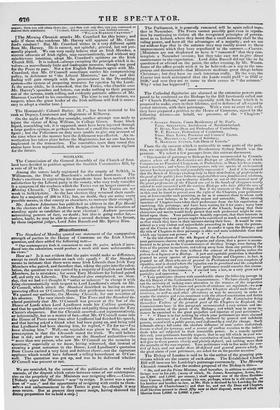1 t
The Standard of Monday quoted our statement of the comparative strength of parties in the House of Commons on the Irish Church question, and then added the following note-
" Our contemporary finds it convenient to omit the pairs, which if intro- duced into the calculation, would produce a result still more unfavourable to its views."
How so ? Is it not evident that the pairs would make no difference, except to swell the numbers on each side equally ? If the Standard means to intimate that there were more Irish Liberals than Irish Tory Members who paired, and therefore that, taking the pairs into the calcu- lation, the question was not carried by a majority of English and Scotch .Members, be is mistaken ; for seven Tory Members for Ireland paired off, and only six Liberals. The Standard also complained, on Mon- day, that we had not thought it " unfair or indecent " to charge it with lying circumstantially with respect to Lord Lyndhurst's attack on Mr. O'Connell, which attack the Standard described as having an over- powering effect on O'Connell, though that gentleman was riot present. We quoted our authority, the Morning Chronicle, for our assertion of is absence. The case stands thus. The Times and the Standard de- clared positively that Mr. O'Connell was present at the bar of the Rouse of Lords when Lord Lyndhurst made his Catiline quotation, and that he quailed like an awe-stricken and guilty thing under the Tory Cicero's eloquence. But the Chronicle asserted—not argumentatively, or inferentially, but as a matter of fact—that Mr. O'Connell came into the House of Peers some time after Lyndhurst had finished his speech, and that having asked a friend what had been going on, and being told that Lyndhurst had been abusing him, he replied, " Tit for tat—I've been abusing him." Well—no rejoinder was given to this, and the presumption is that the Chronicle stated the truth. We still believe that it did ; and place no reliance on the Standard authorities—the 4" more than one person, who saw Mr. O'Connell on the occasion in question ;" especially as we know, having witnessed, that instead of creating a great sensation in the House, Lord Lyndhurst's quotation from Cicero excited a very faint and dubious cheer—not the rapturous applause which would have followed a telling homethrust at O'Con- nell. The quotation was got up, and was to be delivered whether O'Connell was-present or not.


























 Previous page
Previous page